Related Research Articles

Hans Erich Pfitzner was a German composer, conductor and polemicist who was a self-described anti-modernist. His best known work is the post-Romantic opera Palestrina (1917), loosely based on the life of the sixteenth-century composer Giovanni Pierluigi da Palestrina and his Missa Papae Marcelli.

The Women's Orchestra of Auschwitz was formed by order of the SS in 1943, during the Holocaust, in the Auschwitz II-Birkenau extermination camp in German-occupied Poland. Active for 19 months—from April 1943 until October 1944—the orchestra consisted of mostly young female Jewish and Slavic prisoners, of varying nationalities, who would rehearse for up to ten hours a day to play music regarded as helpful in the daily running of the camp. They also held a concert every Sunday for the SS.

The Oper Frankfurt is a German opera company based in Frankfurt.
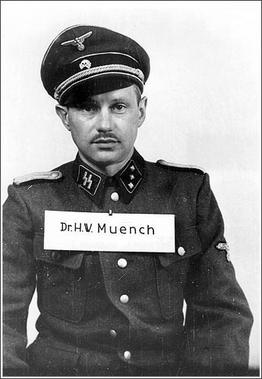
Hans Wilhelm Münch, also known as The Good Man of Auschwitz, was a German Nazi Party member who worked as an SS physician during World War II at the Auschwitz concentration camp from 1943 to 1945 in German occupied Poland. He was acquitted of war crimes at a 1947 trial in Kraków.
James Simon was a German composer, pianist and musicologist.
OMIKE, the Hungarian Jewish Educational Association was a Jewish cultural association that existed from 1910 to 1944.
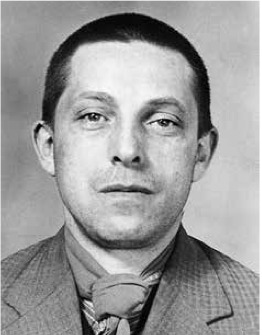
Dagobert Biermann was a German Communist and resistance fighter against National Socialism. His son is German singer and former East German dissident Wolf Biermann. He was murdered in Auschwitz.
Hans Tobias Erl was a German operatic bass.

Magda Spiegel (1887–1944) was a German contralto who was a member of the Frankfurt Opera ensemble and was murdered in the Auschwitz concentration camp. The baritone Richard Breitenfeld, also of the Frankfurt Opera, shared the same fate.

Richard Breitenfeld was a German baritone. He was a member of the Frankfurt Opera ensemble and was murdered in the Theresienstadt concentration camp.

Ottilie Metzger-Lattermann also formerly Ottilie Metzger-Froitzheim was a German contralto who was a famous performer of works by Wagner during the 1910s, and who after her retirement was murdered in Auschwitz.
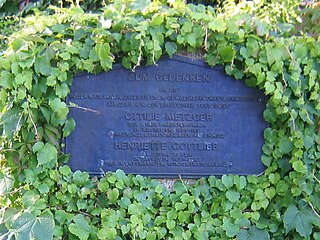
Henriette Gottlieb was a German soprano.
Hermann Schramm (1871–1951) was a German tenor who sang at the Oper Frankfurt in the 1920s and made several recordings for HMV Germany.

Hermann Wronker AG was a German department store chain. Its holdings included the largest department store in Frankfurt before World War II.
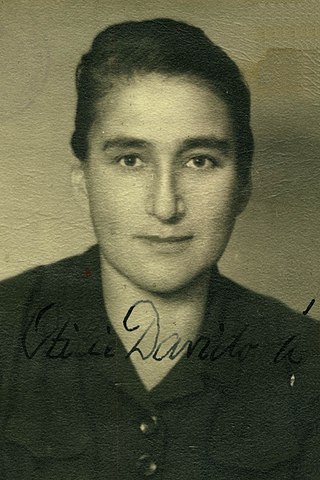
Ottilie "Ottla" Kafka was the youngest sister of Franz Kafka. His favourite sister, she was probably also the relative closest to him, and she supported him in difficult times. Their correspondence was published as Letters to Ottla. She was murdered in the Holocaust.
Heinrich Baab was a secretary and Gestapo chief of Frankfurt at the Lindenstraße station. The Gestapo was the official secret police of Nazi Germany and German-occupied Europe. After the war in Europe ended, Heinrich Baab received a sentence of life imprisonment in March 1950 for his involvement in the Final Solution as the head of Division IIB2. He was imprisoned from 1948 to 1973. On 6 April 1950 he was convicted of murdering 55 Jews from 1938 to 1943 and the attempted murders of 21 Jews, as well as for maltreatment of 29 Jewish prisoners in Frankfurt. His trial was five weeks long, with 157 witnesses testifying, including some of his victims. Heinrich Baab sent many of Frankfurt's Jews to camps from the rail station. Baab's supervisor at the Lindenstrasse station was Oswald Poche. Before joining the police in 1928 in Stettin, Baab was a locksmith. Heinrich Baab's SS membership number was 306631 and his Nazi Party number was 1346669.
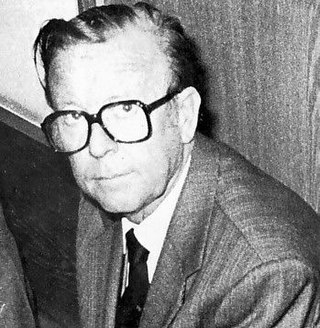
Ernst Heinrichsohn was a German lawyer and member of the SS who participated in the deportation of French Jews to Auschwitz during World War II.
Erna Schlüter was a German operatic dramatic soprano and voice teacher. Beginning as a contralto at the Oldenburgisches Staatstheater in 1922, she moved to the Mannheim National Theatre in 1925 where her voice developed to dramatic soprano, to the Stadttheater Düsseldorf in 1930 where she appeared in 1933 in the world premiere of Winfried Zillig's Der Rossknecht and was awarded the title Kammersängerin. Her last station, from 1940, was the Hamburg State Opera.
Bruno Brodniewicz born 22 July 1895 in Posen, was a German prisoner in the Auschwitz concentration camp. Brodniewicz was the first Lagerälteste, carrying prisoner tag number 1. He died in April 15–16, 1945 in Bergen-Belsen concentration camp.

Fanny Moran-Olden was a German soprano who appeared in leading roles both in her native Germany and in other European opera houses as well as the Metropolitan Opera in New York. She appeared in wide variety of roles but was particularly prominent in the Wagnerian repertoire. Her voice had an unusually wide range which allowed her to sing soprano, mezzo-soprano and contralto roles. She was born in Cloppenburg and died hopelessly insane at the age of 49 in a sanatorium on the outskirts of Berlin. She was married twice, first to the tenor Carl Moran and secondly to the Wagnerian bass-baritone, Theodor Bertram.
References
- ↑ F. C. DeCoste, Bernard Schwartz The Holocaust's ghost: writings on art, politics, law, and education p80 2000 "One was baritone Erhard E. Wechselmann, who had also fled Germany for Amsterdam, where for awhile he served as cantor for the Jewish congregation. Others who died in Auschwitz, often via Holland and Terezin, were Alfred Kropf, a conductor from Stettin; Magda Spiegel, a Frankfurt contralto; and composer James Simon, a student of Max Bruch."
- ↑ Peter Hugh Reed, American Record Guide, No. 16, 1949. Quote: "Official confirmation has at last come through informing us that this grand old singer, a fine baritone, who sang with the Metropolitan Company in 1890, died in a Jewish camp in Poland in 1943. The exact day of his death has not been ascertained."
- ↑ Jüdisches Musik- und Theaterleben unter dem NS-Staat Stephan Stompor, Andor Izsák , Susanne Borchers - 2001 "Zwei Wochen danach gab Ottilie Metzger-Lattermann mit dem Bariton Erhard Wechselmann einen Lieder- und Duette-Abend."
- ↑ Dinah Shelton Encyclopedia of genocide and crimes against humanity 2 2005 "However, among them are: the baritone and cantor Erhard E. Wechselmann, murdered in Auschwitz; the contralto Magda Spiegel, murdered in Auschwitz; Richard Breitenfeld, a member of the Frankfurt opera ensemble, murdered in Theresienstadt"